The Prince of Profit
In the midst of a massive recession, one of the world's richest men may have lost the biggest fortune; his holdings have plunged $8-10 billion. Yet the reformist, philanthropist and jet-setting Saudi Prince Alwaleed bin Talal isn't dwelling on his loses. He still has his James Bond yacht, and the world's largest private jet, plus his numerous desert palaces. There, he plots his next acquisitions. In such uncertain times, he sees opportunity.
By Ron Gluckman/Riyadh, Saudi Arabia
ALL AROUND THE WORLD, WEALTH IS IN TANKING. Fortunes have evaporated, almost overnight. Commerce has come to a standstill, as some of the world's biggest investors have pulled back. The chaos is killing the global economy, but even the biggest banks and most flamboyant risk-takers are taking a wait and see stance.
Yet to one of the world's biggest billionaires, Prince Alwaleed bin Talal bin Abdulaziz Alsaud of Saudi Arabia, this is worse than putting the brakes on a global economy that desperately needs a bit of fuel. It's also missing the chance of a lifetime.
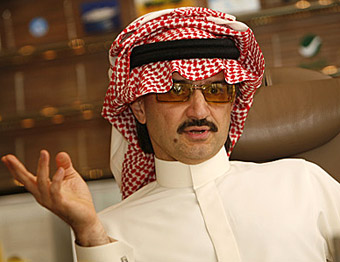 “This is a fantastic opportunity. Now is the time to buy,” says the Saudi prince
with great exuberance. “I’m totally, 100-percent optimistic.”
“This is a fantastic opportunity. Now is the time to buy,” says the Saudi prince
with great exuberance. “I’m totally, 100-percent optimistic.”
Such confidence amidst the global economic malaise would be inspiring from almost anyone, but what makes the unbridled buoyancy particularly striking is the perspective of Prince Alwaleed bin Talal. Long among the world’s richest men, he’s in an ultra-elite crowd of mega-billionaires. Forbes Magazine regularly lists him in the Top 10 or Top 20 of the world’s richest, pegging his personal wealth in 2008 at $21 billion.
What truly puts Prince Alwaleed in an ultra-exclusive class is what happened since: his investments tanked. Many know the buzz of making billions, but this Prince is among the rarest of the rare who can describe losing similar sums.
Everyone these days is feeling the pinch – Forbes estimated that perhaps a quarter of the world’s billionaires were slapped back into the class of mere multi-millionaire – yet few can match the Prince’s particular misfortune. Or pluck. Conservative estimates put his recent loses in the neighborhood of $3-4 billion. Forbes estimated in March that his personal fortune shrank nearly $8 billion, or almost 40 percent from the year before.
What’s it feel like to lose so much money? “I’m not down at all,” insists the handsome Prince, who turned 55 in March 2009. “You should know that I take each loss seriously, each million, each 100 million, each billion. Of course, it affects me. It impacts me. I take it personally. I just make sure it never happens again.”
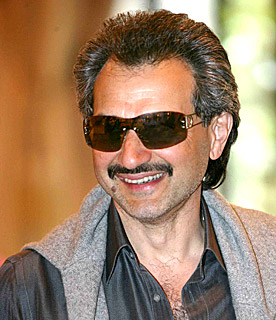 When the going gets tough, according to this entrepreneurial prince, that’s the
time to go shopping. “This is an opportunity. I see this as a time of incredible
opportunity. You buy into companies when they are devastated.”
When the going gets tough, according to this entrepreneurial prince, that’s the
time to go shopping. “This is an opportunity. I see this as a time of incredible
opportunity. You buy into companies when they are devastated.”
This Prince would know. He’s cultivated his vast fortune with an uncanny knack for buying at rock-bottom prices. Prince Alwaleed first gained international fame with a fortuitous bailout of Citicorp. He paid $207 million for 4.9 percent of a banking firm on the brink of bankruptcy in 1990, investing $590 million more in the gloomy days just before the first Gulf War. Within eight years, that stake soared to a value of $7.6 billion.
As to his recent declines, he retorts that he has suffered, in percentage terms, similar setbacks before. His shares in CITI (as it’s now known) were valued this February at $623 million. That’s more than a 90 percent dive from the peak price. “On my scale, you don’t make mistakes, you make blunders,” he says, laughing. Then, dead-serious, he adds: “I’ve made my fortune before. I know I can do it again.”
Indeed, little seems out of the ordinary in the Prince’s luxurious office in Riyadh, Saudi Arabia. Dressed traditionally, in red-and-white checkerboard headscarf and long, beige robe, the Prince sits flanked by rows of 16 televisions, behind a massive desk on the top floor of the tallest building in the kingdom.
This is headquarters of Kingdom Holdings – his holdings (the Prince owns 95 percent of the recently-listed company). You enter the guarded elevators to his office via the ground-floor lobby of the glitzy Four Seasons, the country’s finest hotel - the Prince’s hotel. He owns many properties in the Middle East and around the globe run by the luxury chain, and bought Four Seasons for $3.7 billion in 2007 with his pal Bill Gates. He is also majority owner of the premium Raffles and Fairmont brands, and has a sizeable stake in the Movenpick hotel chain.
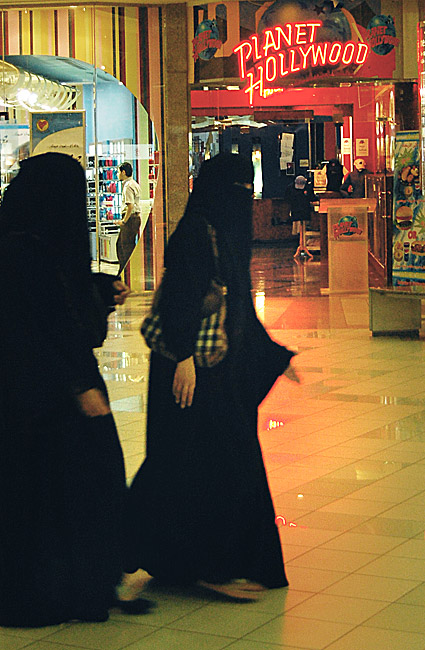 The Four Seasons is the center of high society in modern Riyadh; smartly robed
Saudi men bark into cell phones and do deals in the lobby. Women bustle past in
black burqas bound for the adjacent high-end mall – the Prince’s mall – filled
with Saudi’s top shops. International outlets range from Saks Fifth Avenue to
Planet Hollywood, and the Prince has a stake in practically all of them.
The Four Seasons is the center of high society in modern Riyadh; smartly robed
Saudi men bark into cell phones and do deals in the lobby. Women bustle past in
black burqas bound for the adjacent high-end mall – the Prince’s mall – filled
with Saudi’s top shops. International outlets range from Saks Fifth Avenue to
Planet Hollywood, and the Prince has a stake in practically all of them.
His interests and investments range far and wide – from Apple and Motorola to Euro Disney to the biggest food and real estate companies in the Middle East. The attraction, he says, is an ability to build value and realize high returns. Even in the highly competitive hotel industry, where many look to long-term equity rather than cash-flow, he notes: “Our average return has been 35 percent, over the last 25 years.”
The Prince has a keen mind for figures, and an encyclopedic embrace of his varied investments, which he jokingly calls “my 100 wives.” Muslims can take multiple wives, but this devout follower – he prays five times daily, and twirls prayer beads constantly - has never done so. He finds variety in the world of finance. The wall behind his desk is a mosaic of color, comprised of logos of all the companies he has shares in. “He knows them all, and their finances down to the last dollar,” one top associate confides. “His memory is photographic.”
Indeed, he can recite numbers at a rate that leaves even reporters reeling: the exact percentages he holds in the wall of investments right down to the latest trading price of each, which he checks regularly on the banks of TVs and his desktop computer. Even on sojourns to his desert palace, where he retreats nearly every week, he is rarely without laptop, or satellite phone. He’s a serial SMS sender, punching out messages during meetings. Yet, until 2004, he rarely carried a mobile phone, according to his biographer, well-known TV newscaster Riz Khan. Princess Reem, one of two children from his first marriage, introduced him to SMS, and he was instantly hooked.
He’s also a television junkie, favoring business news, but he’s an avid reader, who sets aside several hours daily to indulge. His thin frame attests to both his dietary habits and enthusiasm for exercise. While studying in the United States, he put on serious weight. Ever since, he’s been a strict vegetarian who avoids fatty foods, and a keen walker and cyclist. “I ride for an hour every day,” he says, but concedes keeping a phone handy for deal making. An acknowledged workaholic, he sleeps only five hours a day.
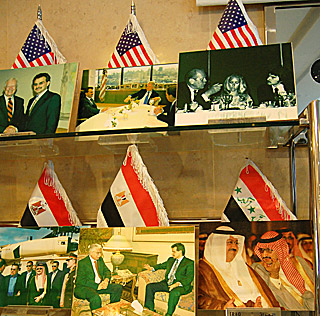 His discipline is as renowned as his meticulous routine. “Every minute is
accounted for,” notes Heba Fatima, executive manager of his communications
department. “He’s not like other royals. He’s quite structured. You can time
your watch by him.” She offers a thick stack of papers, the itinerary for a
recent London trip. Details are exhaustive; even strolls of 15 minutes are
scheduled. “Everything he does is here.”
His discipline is as renowned as his meticulous routine. “Every minute is
accounted for,” notes Heba Fatima, executive manager of his communications
department. “He’s not like other royals. He’s quite structured. You can time
your watch by him.” She offers a thick stack of papers, the itinerary for a
recent London trip. Details are exhaustive; even strolls of 15 minutes are
scheduled. “Everything he does is here.”
He roams the globe meeting presidents, kings and celebrities – the Kingdom waiting room is crammed wall-to-wall with photos of the Prince and world leaders, underneath scores of honorary degrees. Several racks are packed with reprints of magazine stories about the Prince, yet he likes to talk about less illustrious topics, like his investments in Africa. “We are involved in 30 countries,” he says, noting that he has crisscrossed the continent. “I’ve been to 48 countries in Africa; there are only two I haven’t been to.”
He grows extremely animated as he recalls a particularly moving visit a decade ago to Nigeria, where he met the president. “He was very upset. There was a famine and he was frustrated with the response from aid agencies.” Relief was arriving, but a few thousand here and there, from different countries. “He was in tears. He told me that two to three million of his people would die within the next few months.” The Prince had scant knowledge of Nigeria, an unscheduled stop on an African tour, but knew what had to done. “I gave him three million right there, then another four million. I was shocked to find out that a few million dollars could save a million people.”
Almost as much as this profit-minded Prince likes to make money, he is thrilled to give it away. This also puts him in a select crowd of billionaires – he’s a major philanthropist, and has been for decades. “I’ve been giving away $100 million or more for some time now,” he says proudly, noting that this passion for philanthropy predates any trend among fellow multi-billionaires like Bill Gates and Warren Buffet. “When I started, 25 years ago, there was no Gates Foundation. And Buffet only began a few years ago.” Associates estimate his philanthropy has totaled $2.5 billion to date.
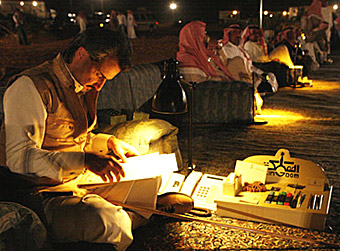 Even as his investments dive, the Prince refuses to tighten the purse strings.
Quite the contrary, he plans to increase his philanthropy through Alwaleed bin
Talal Foundation. He has given over $100 million to some of the world’s top
universities – Georgetown, Harvard and Cambridge – mainly for Islamic studies or
Muslim-Christian understanding. He has also endowed American study centers in
Cairo and Beirut. His charity is varied and boundless. A gift of $20 million to
the Louvre was the Paris museum’s largest single donation. After a tsunami swept
Asia in 2004, he was the largest individual aid donor.
Even as his investments dive, the Prince refuses to tighten the purse strings.
Quite the contrary, he plans to increase his philanthropy through Alwaleed bin
Talal Foundation. He has given over $100 million to some of the world’s top
universities – Georgetown, Harvard and Cambridge – mainly for Islamic studies or
Muslim-Christian understanding. He has also endowed American study centers in
Cairo and Beirut. His charity is varied and boundless. A gift of $20 million to
the Louvre was the Paris museum’s largest single donation. After a tsunami swept
Asia in 2004, he was the largest individual aid donor.
“This absolutely will not be touched by anything that happens at Kingdom,” he says of his charity, which is not bound by faith, only need. “Charity and assistance have no religion,” he says. “In my view, there is no grand vision, only great need.”
Foundation Director Muna AbuSulayman, a former television personality who has been dubbed the Arabic Oprah Winfrey, says the focus going forward is on maximum impact. “The Prince has never stopped giving, and has grown very strategic,” she says. The goal at the foundation is to target key individuals with innovative ideas, and help bring them to fruition, and provide seed money to spur on worthy projects. “There are only a handful of big foundations in the Arab world that have over $25 million to give. With a fund this size, we can do a lot, especially linked to strategic partners.”
Not all of the princely gifts have been well received. Perhaps his most famous donation is one that was refused. In the aftermath of September 11, 2001 attack on the World Trade Center, Prince Alwaleed flew to New York, presenting Mayor Rudy Giuliani with a check for $10 million. The offer was rebuked following remarks made by the Prince suggesting that America consider the motivation for the attack, and its policy in the Middle East.
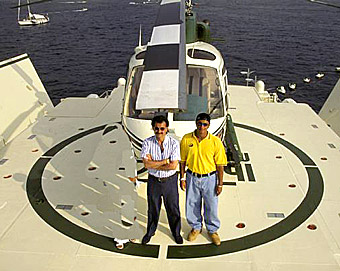 Many including President Obama now suggest much the same, but at the time, it
was an unpopular opinion. Ironically, the Arab world rallied around a Prince
often criticized for being too pro-western. “Even Yasar Arafat called to
congratulate me,” he says, not that he was trying to curry favor. “I did it as a
gesture, as the biggest foreign investor in the United States, to show that
Saudis really cared about the US.” Instead, he feels Giuliani milked the
controversy for political purposes.
Many including President Obama now suggest much the same, but at the time, it
was an unpopular opinion. Ironically, the Arab world rallied around a Prince
often criticized for being too pro-western. “Even Yasar Arafat called to
congratulate me,” he says, not that he was trying to curry favor. “I did it as a
gesture, as the biggest foreign investor in the United States, to show that
Saudis really cared about the US.” Instead, he feels Giuliani milked the
controversy for political purposes.
The experience was a rare step into the political spotlight for Prince Alwaleed, who is connected to ruling families in both Saudi Arabia as well as Lebanon. His maternal grandfather was Riad El-Solh, the first Prime Minister of modern-day Lebanon. Prince Talal, his father, is son of Saudi Arabia’s founding King Abdul Aziz Al Saud. The current king is his uncle.
Yet he rebelled against the royal court, to the extent that his family shipped their wild son to a military academy when he was only 13. “It was a life-changing experience,” he recalls. The youngest and smallest student in the school’s history, he quickly acquired the discipline that he had lacked, and that guides him to this day.
Much is made of his meteoric rise, after returning from studies in the United States. He started with a small loan from his father, and quickly moved from construction and real estate into banking. He made his first billion by 1988, and by 1990 his worth was estimated at $4 billion.
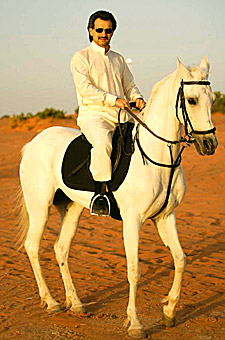 The Prince has not been above the temptations of wealth. He travels in his own
747, but will soon move into an A380. The price reportedly was $300 million, not
including outfitting, which could cost hundreds of millions more. “I bought the
plane because I got a good price,” he says, repeating what is practically his
mantra.
The Prince has not been above the temptations of wealth. He travels in his own
747, but will soon move into an A380. The price reportedly was $300 million, not
including outfitting, which could cost hundreds of millions more. “I bought the
plane because I got a good price,” he says, repeating what is practically his
mantra.
He owns horses, fleets of cars, and his family has just moved into 420-room palace, complete with a pair of indoor pools and indoor tennis court. They also have a 120-acre retreat outside Riyadh with lavish stables, a small zoo and five artificial lakes.
Every year, they sail on his yacht “Kingdom” off the coast of Cannes, where film fans may do a double take. Formerly called “Nabila,” the boat served as the villain’s lair in the James Bond flick “Never Say Never,” and later belonged to Donald Trump. When hard times hit, Trump dumped it, and the Prince pounced. “I bought it for $19 million, and the replacement cost would have been $150 million.”
Unlike many royals in the region, the Prince has never been linked with bad art, gaudy mansions or wild partying. He has had four wives, but one at a time. “I don’t collect cars or art,” he notes. “I collect companies.” His main diversion, he says, is his weekly retreat in the desert, where he meets with Bedouins, strolls deep into the sand, then stays up late staring at a log fire, pondering his next investment.
Even amidst the current downturn, which has been especially cruel to real estate, the Prince plans to move ahead within months on his most ambitious project: Kingdom Tower, the world’s first mile-high skyscraper, and Kingdom City, a surrounding 1750-acre commercial and residential development in the holy city of Jeddah. The cost could top $10 billion. Also on the drawing board is Kingdom City, a $6.6 billion mix of housing, hotels and a snazzy country club on over 4000 acres east of Riyadh.
“What drives me?” He ponders for only a moment. “Success,” he says. “Success, success, success. I’m the kind of person who never sees a glass as half empty. I’m always the optimist. To me, it’s always half-full.”
Ron Gluckman is an American reporter who has been covering Asia and the Gulf region since 1991. He visited Saudi Arabia in March 2009, interviewing Prince Alwaleed for this story for Prestige Magazine (USA) in June 2009.
Office and Planet Hollywood photos by RON GLUCKMAN; yacht from the web. The rest all courtesy the office of His Royal Highness Prince Alwaleed bin Talal.
To return to the opening page and index
push here
[right.htm]
